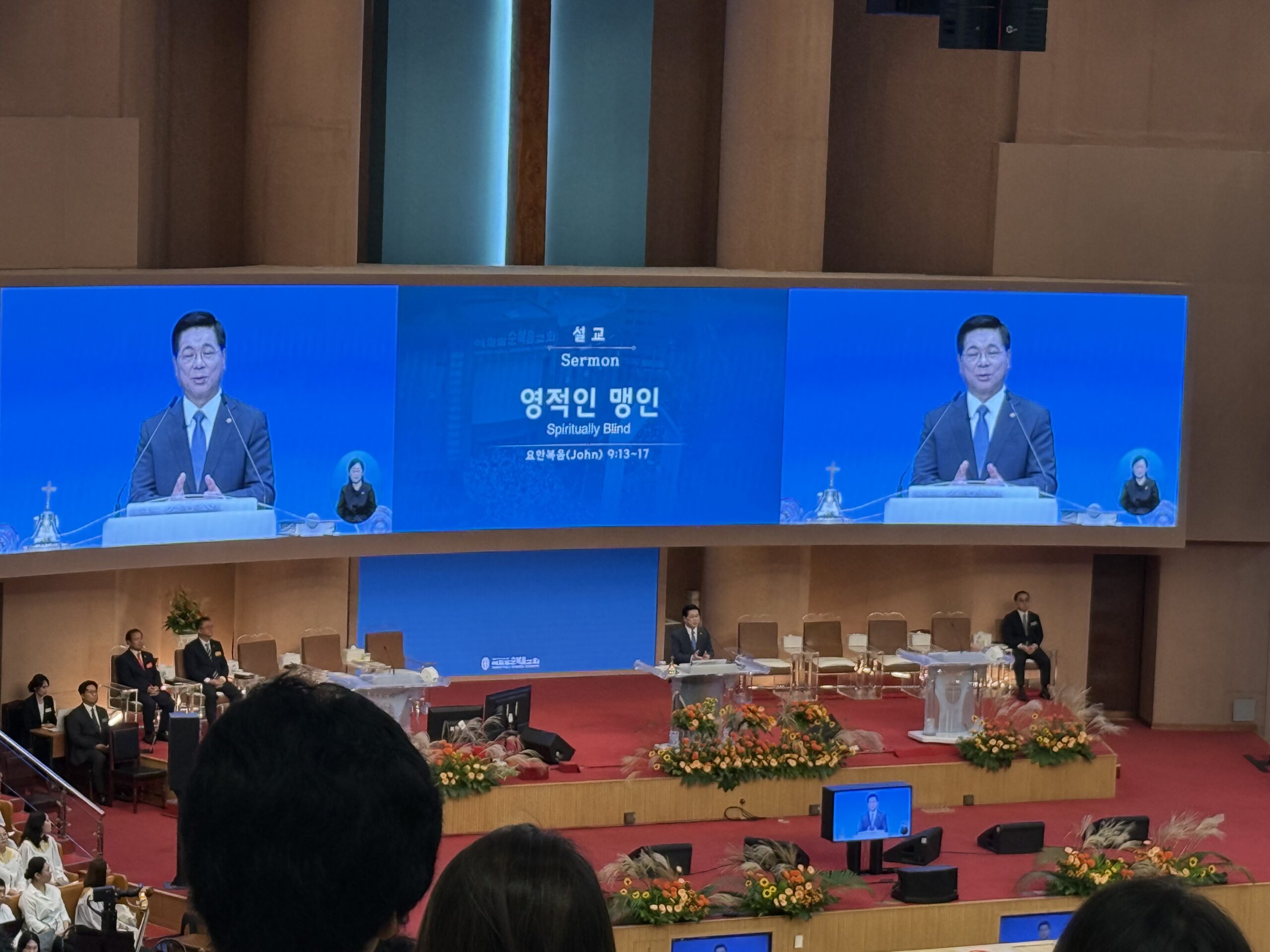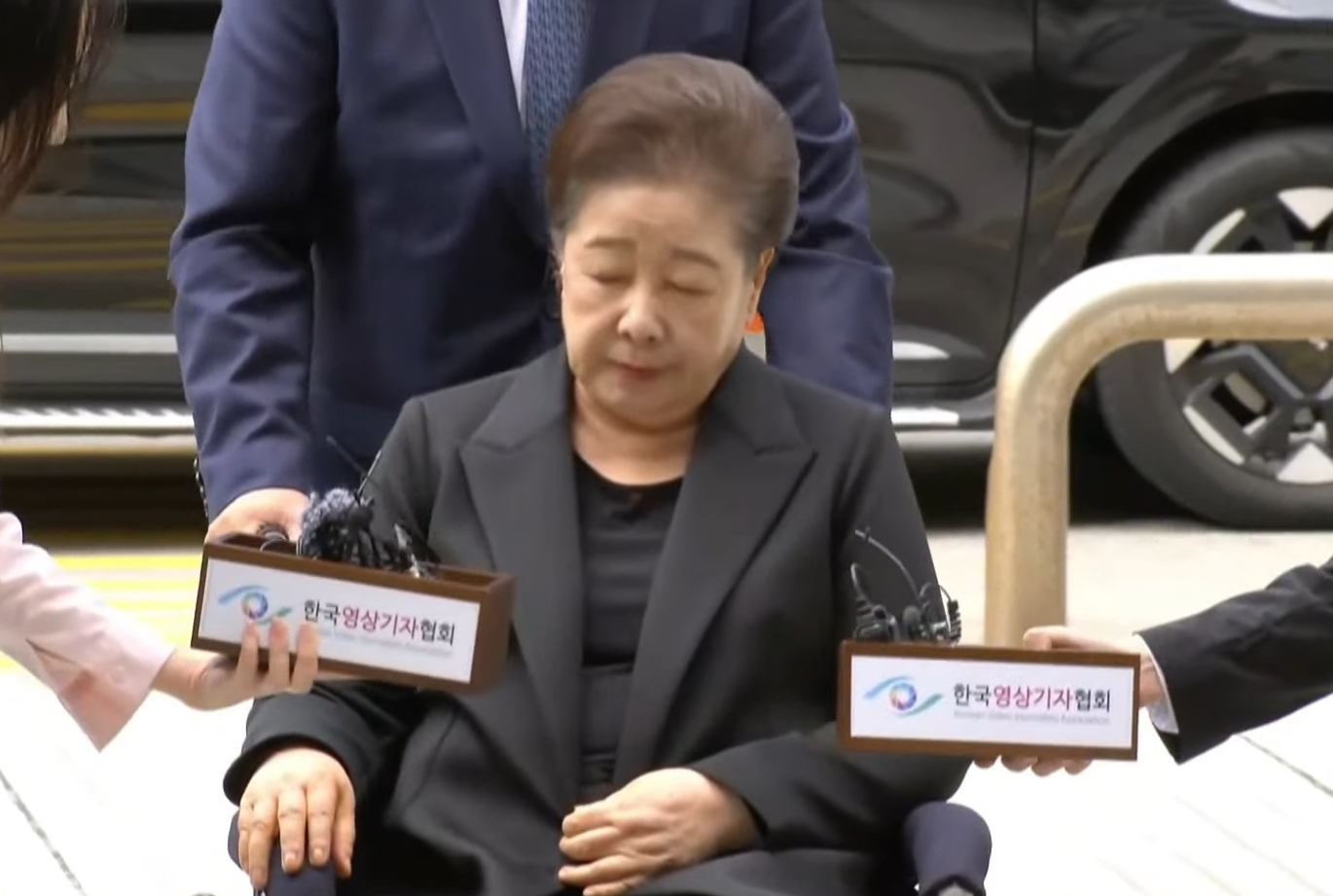The legal grounds for the arrest were absent. The charges are implausible and politically motivated. This is not a corruption case—it’s a purge.
by Massimo Introvigne

South Korea has just added a new chapter to its long-running saga of political purges disguised as criminal justice. This time, the protagonist is Dr. Hak Ja Han Moon—known to her followers as “Holy Mother Han”—the 82-year-old leader of the Family Federation for World Peace and Unification (formerly the Unification Church). Her arrest is not just a legal misstep. It’s a full-blown religiocide, a state-sponsored assault on religious liberty dressed up in the robes of anti-corruption.
Protesting is necessary, but not sufficient. What’s needed is clarity. “Bitter Winter” will dissect this travesty by answering three questions. Was there any legal basis for arresting Mother Han? What exactly is she accused of? Is this a case of common crime—or a political and religious purge?
1. The Legal Grounds for Arrest
In Korea, like in most democracies, pre-trial detention is justified only if there’s a risk of flight or destruction of evidence. Let’s test these against reality.
Flight risk? Mother Han is 82, recovering from heart surgery, and has been under a travel ban since March. She’s not exactly sprinting for the airport.
Destruction of evidence? This is the aspect Seoul Central District Court Judge Jeong Jae-wook underlined in the arrest decision. However, Mother Han’s residences and church offices have been raided multiple times. Prosecutors have already seized every scrap of paper, every hard drive, every byte of data. What’s left for her to destroy—her memories?
In short, the arrest warrant is built on sand. The legal prerequisites were not met.
2. The Charges
Second, the charges. The Special Counsel has thrown four charges into the mix. Two others—alleged mass enrollment of church members into the conservative People Power Party (PPP) and cash gifts to Rep. Kweon Seong-dong, a PPP leader who has also been arrested—are still under investigation and not part of Mother Han’s arrest warrant.
These additional charges are concerning, as they appear to infringe upon the constitutional right of every citizen, including religious individuals, to support the politicians and parties of their choice. The claim that Mother Han enrolled 110,000 members of the Family Federation in the PPP exceeds the total membership of her religious organization in Korea (the figure of more than one million members, mentioned in the Korean media, includes sympathizers and “ambassadors for peace” of the Universal Peace Federation who are not devotees of the church).

I will concentrate on the four charges listed in the arrest warrant.
Charge #1: Bribery via Rep. Kweon. Mother Han allegedly instructed a church executive (already indicted and expelled from the Family Federation) to deliver ₩100 million to the PPP and President Yoon’s administration through Rep. Kweon. The figure is frequently reported in international media in Korean won only and may impress some readers. However, converting to U.S. dollars, it amounts to $73,000. South Korean politicians may be cheap, but in a region troubled by widespread corruption and substantial bribes, the notion that you can buy the ruling party and the President of a G20 country for just $73,000 is absurd.
And the supposed goal? Influence over a wire agency acquisition and Cambodian business interests. Neither materialized. Prosecutors even claim the money was used to secure VIP seats at Yoon’s inauguration. This from a woman who hosts global summits with presidents and prime ministers—including Donald Trump. The idea that she’d commit a felony for a seat at a domestic ceremony is laughable.
Charge #2: Gifts to the First Lady. A diamond necklace ($43,000) and two Chanel handbags ($14,000) were allegedly gifted to President Yoon’s wife via a shaman intermediary. Mother Han denies involvement, claiming the rogue executive is responsible for the act. Unsurprisingly, he is attempting to shift all blame onto her for his misdeeds. The total value is a fraction of what’s typically high-stakes bribery in Korea. Add some ginseng tea to the mix, and you still don’t have a political scandal—you have a luxury shopping spree at best.
Charge #3: Embezzlement. Prosecutors claim Mother Han used church funds for personal activities, including gifts. But this looks like stealing from her own pocket: in religious movements like the Family Federation (and larger ones), the line between personal and organizational finances is often blurred. Donors revere Mother Han as a messianic figure and likely see no distinction between giving to the church and giving to her.
Charge #4: Destruction of Evidence. In 2022, Mother Han allegedly instructed the same executive who gifted the First Lady with bags and jewels to destroy evidence of her gambling in Las Vegas. The narrative surrounding gambling might seem compelling to those not well-versed in the history of the Unification Church. The allegations date back almost fifty years.
Gambling is illegal for Korean citizens, domestically (with the exception of Kangwon Land Casino, located in Jeongseon, Gangwon Province) and abroad. However, the reasons behind Mother Han’s alleged attempts to destroy evidence in Korea in 2022, related to her gambling in the U.S. more than a decade earlier, remain unclear. Numerous anti-cult books and websites broadcast these stories for half a century. The documents that Korean prosecutors claim Mother Han sought to conceal have already been disclosed and utilized in court proceedings by rival factions opposing her and the church.
Reverend Moon himself addressed these issues during a well-known speech on October 7, 1979, which the church still makes publicly available online. In that address, he articulated his intention to engage with the Las Vegas gambling scene, emphasizing his goal of reaching out with a message of salvation—even in such an unexpected environment: “If religious people run away from evil, who will take responsibility for cleaning it up?”
The evangelistic strategy of mingling with sinners to evangelize them can surely lead to problems and suspicions, as evidenced by Jesus being accused of eating with publicans and prostitutes. Some may find this approach questionable.
However, this is not the focus of the current situation in Korea. The key point is that Mother Han did not need to engage in illegal activities to prevent the story of gambling from becoming public. This narrative has been known and widely used by her opponents for over forty years. So why would Mother Han try to bury a story that’s already been exhumed, dissected, and archived?

3. The Context
This isn’t just about Mother Han. It’s about a sweeping purge of religious leaders accused of having supported former President Yoon and the PPP. In a recent study, Swiss scholar Adrian Gasser evidenced the significant support of a coalition of religious groups drawn to his anti-Communist and anti-gay rights agenda for the now disgraced President Yoon. Ironically, some of Yoon’s religious supporters were anti-cult crusaders. Now they may share jail cells with the “heretics” they once condemned.
The Family Federation and Shincheonji, another significant Korean new religious movement, were among the primary targets. Shincheonji is now also accused of enrolling thousands of members in the People Power Party (PPP) to support Yoon during the primaries that preceded the presidential elections. Representatives of the current ruling party, the Democratic Party of Korea (DPK), are even calling for the disbandment of the PPP, alleging that it operates as a front for religious groups and “cults.”
Pastor Lee Young-hoon, the leader of Yoido Full Gospel Church, the largest Pentecostal congregation in the world, and Pastor Kim Jang-hwan from the Far East Broadcasting Company, who is also the former president of the Baptist World Alliance, had their churches and offices raided.

They are accused of lobbying in favor of Lin Seng-geum, a former Marine Corps 1st Division Commander and supporter of President Yoon. Lin is facing charges of involuntary manslaughter following the death of Corporal Chae Soo-geun, who died in 2023 during a flood rescue mission. It is alleged that Corporal Chae was sent on this mission without proper safety equipment.
Pastor Son Hyun-bo of Busan Segyeoro Church was arrested for allegedly violating election laws by mobilizing church devotees to support the PPP.
The common thread? All supported Yoon. All are now targets. The crackdown is so blatant that President Trump himself denounced the “vicious raids on churches” in Korea. And he’s not wrong. This is not about handbags or necklaces. It’s about silencing religious voices that dared to back the wrong candidates.
Korea has a tradition of prosecuting and jailing former presidents. But what’s new here is the religious dimension of this national sport. Yoon’s rise was fueled by a coalition of conservative religionists—evangelicals, Pentecostals, and some new religious movements. Now, the leftist government is targeting them all.
At the 2021 funeral of Yoido’s founder, Pastor Kim laid hands on then-Prosecutor General Yoon, effectively endorsing him as a PPP candidate for President. Today, that gesture is being repaid with raids and arrests.
Let’s also dispense with the myth that the Family Federation was some kind of monolithic political machine for President Yoon. It wasn’t. Yes, the organization shared certain conservative values with the PPP—anti-Communism, traditional family structures, and the like—but support was far from unanimous or unconditioned. Local church leaders held a spectrum of political views, and Mother Han’s events have historically welcomed representatives from both the PPP and the DPK. Inclusivity, not partisanship, was the norm.
But in today’s climate, nuance is a crime. Any whiff of past sympathy for the PPP—no matter how qualified or incidental—is now treated as treason. The message from the special prosecutors is clear: if you once dared to shake hands with the wrong party, we’ll slap you in cuffs. Retroactive guilt by association has become the new judicial standard.

If this were just about Mother Han, skeptics might cling to the bribery narrative. But the scale of the crackdown reveals the truth: this is a broad political and religious purge. And with Korea’s prosecutors boasting a 95% conviction rate, the stakes are existential—not only for Mother Han, who, due to her health condition, is at high risk of not surviving imprisonment, but also for the broader issues of religious freedom and democracy.
International protests are vital. But they must be clear-eyed and focused. The legal grounds for arresting Mother Han were absent. The charges are implausible and politically motivated. This is not a corruption case—it’s a purge.
The world must not mistake persecution for prosecution. Korea’s democracy and religious liberty are on trial. And the verdict will echo far beyond its borders.





